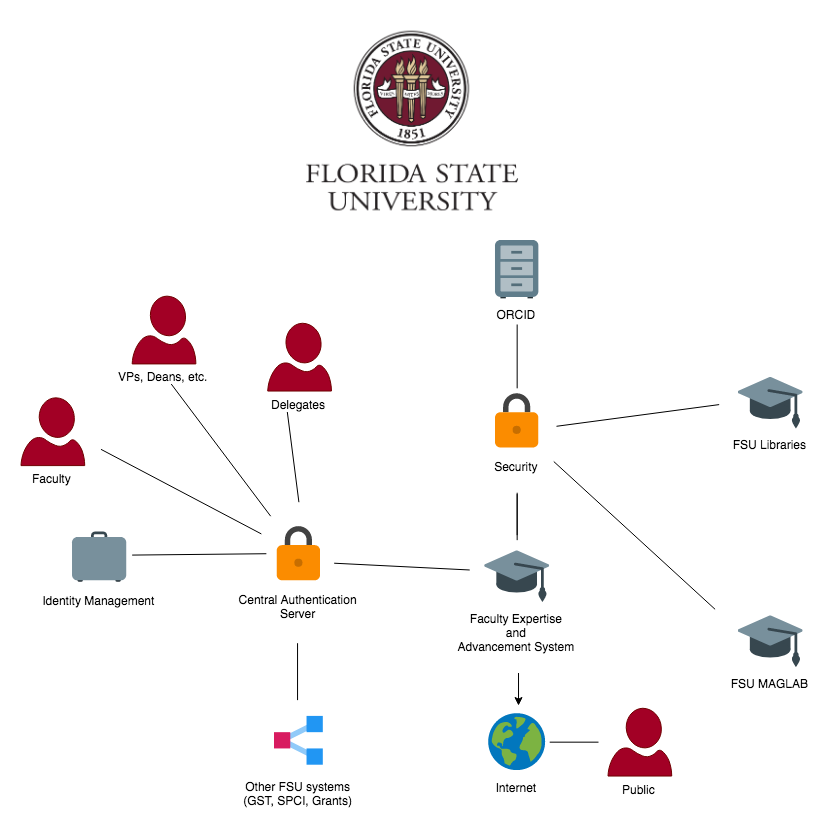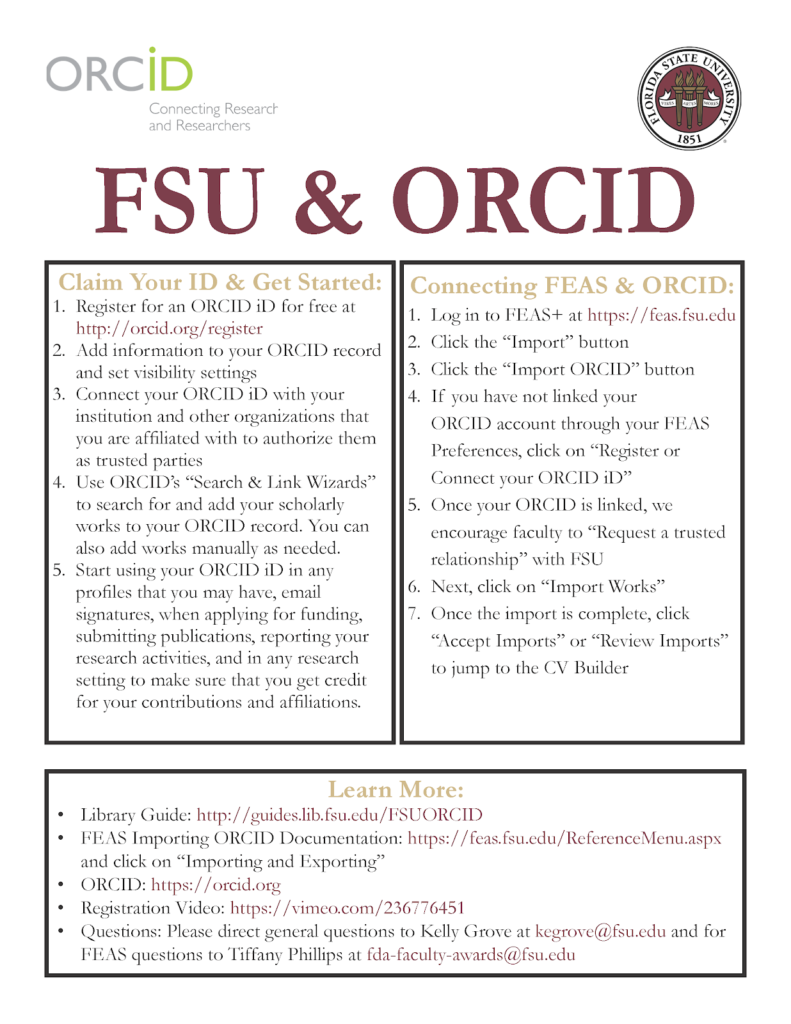
Florida State University (FSU) became a member of the ORCID US Community in spring of 2018 to help their researchers gain credit for their works and contributions, leverage the ORCID API for system interoperability, and get a better idea of institutional impact through more efficient reporting on grants and publications. Tiffany Phillips, IT support specialist in the FSU Office of Faculty Development & Advancement, presented on FSU’s ORCID efforts to date at the 4th ORCID US Community Showcase webinar on Sept. 24, 2019, and Kelly Grove, STEM Research & Learning Librarian at FSU Libraries also presented on local ORCID efforts at the 2019 Digital Library Federation (DLF) Forum. The following blog post is derived from these presentations. Many thanks to Tiffany and Kelly for sharing FSU’s ORCID story!
FSU’s ORCID membership originated as a joint effort between FSU Libraries, the Office of Research, and the Office of Faculty Development & Advancement. These stakeholders initiated an “ORCID Implementation Committee” comprised of staff from various campus units to collaboratively strategize and plan for ORCID adoption across campus. Specifically, the taskforce is responsible for overseeing:
- Development of an implementation plan comprising targets and timelines for education, marketing, and assessment
- Formation of an outreach team to work on education and marketing, including a communication plan and a series of workshops and presentations
- Formation of a campus support team to create an online portal of relevant information and resources and respond to queries from the campus community
- Assessment of the success of ORCID implementation efforts, including system integrations and uptake by FSU faculty and graduate students
Upon forming this committee, initial areas of focus for ORCID API integrations were identified, including the FSU home-grown research information management system known as FEAS (Faculty Expertise & Advancement System), managed by the Office of Faculty Development & Advancement; and an integration with the FSU central ID management system to truly enable an “enter once, re-use often” data structure using ORCID. So far, the FEAS integration has been completed (see details below), and discussions are underway for additional integrations including FSU Libraries systems and the National High Magnetic Field Lab (aka MagLab).

This diagram illustrates the existing and intended data connections to be made with ORCID at FSU.
With technical work underway, the committee has also organized outreach efforts to educate faculty and students about ORCID. Outreach efforts have included:
- Reaching out to faculty through announcements from the Office of Research, Faculty Development, and the Libraries urging all to connect their ORCID iD with FEAS
- Including ORCID education in various workshops and new faculty orientation
- Working with the Graduate School to increase awareness and use of ORCID by early career researchers
- Partnering with the Marketing & Communications Office to develop FSU-specific ORCID marketing material and strategy
- Hosting a campus “ORCID day” to spread conversation across departments, labs, and research centers
ORCID iD registration at FSU has increased due to coordinated outreach efforts across campus.
In fall of 2018, the FSU Office of Faculty Development & Advancement integrated the ORCID member API with their homegrown faculty research information management system known as FEAS (Faculty Expertise & Advancement System) to make it easier for faculty to populate their information in the system. FEAS houses information about faculty and their research, including CV information, publications, and grants received. With the integration, faculty members can authenticate and connect their ORCID iD to FEAS and then import works data from their ORCID record into their FEAS profile. Data within FEAS is used for annual faculty reviews, promotion & tenure, and general reporting.
To connect an ORCID iD with FEAS, faculty must first log in to their FEAS profile. In the preferences section of their profile, a button prompts the faculty member to “Register or Connect” their ORCID iD:
This button launches the user into the standard ORCID OAuth process whereby the user logs in to their ORCID record if they already have an ORCID iD, or they register for an ORCID iD if they don’t already have one, before authorizing FSU FEAS as a trusted party on their ORCID record. Once the faculty member has connected their ORCID iD with their FEAS profile, a confirmation appears displaying their authenticated ORCID iD:
In the Preferences section of the FEAS profile, faculty can confirm that they have connected their ORCID iD with their FEAS profile.
Faculty can also or alternatively connect their ORCID iD with FEAS when adding works entries to their FEAS profile. FEAS provides the ability for faculty to import works from FSU sources, a pub file, or ORCID:
Faculty can connect their ORCID iD with FEAS in order to import works data from ORCID into their FEAS profile.
A confirmation message will appear once a faculty member has connected their ORCID iD with FEAS to import publications.
Once the faculty member has gone through the ORCID authentication process, they can choose to “import works,” at which point the system runs a comparison based on title and DOI to make sure they are not importing duplicate works entries from ORCID into FEAS.
When importing works from ORCID to FEAS, entries are filtered by title and DOI to prevent duplicate entries in FEAS.
To promote this functionality to faculty and encourage authenticated ORCID connections, FSU staff have coordinated workshops, handouts, and announcements, including information about ORCID and FEAS in new faculty orientation packets with basic instructions. FSU also has an ORCID LibGuide that is updated on a regular basis to provide additional support for faculty.
FSU’s ORCID flier explains the benefits of ORCID for researchers

On the flip side, the flier explains how to connect an ORCID iD with FSU systems.
To learn more about FSU’s ORCID activities, consider reviewing the webinar and presentation slides on which this blog is based. Many thanks to Tiffany Phillips and Kelly Grove at FSU for collaborating, as well as the following team members at FSU:
- Devin Soper
- Roxann Mouratidis
- Camille Thomas
- Grace Adkison
- Kari Roberts
- Evangeline Ciupek
For questions, please contact orcidus@lyrasis.org.
